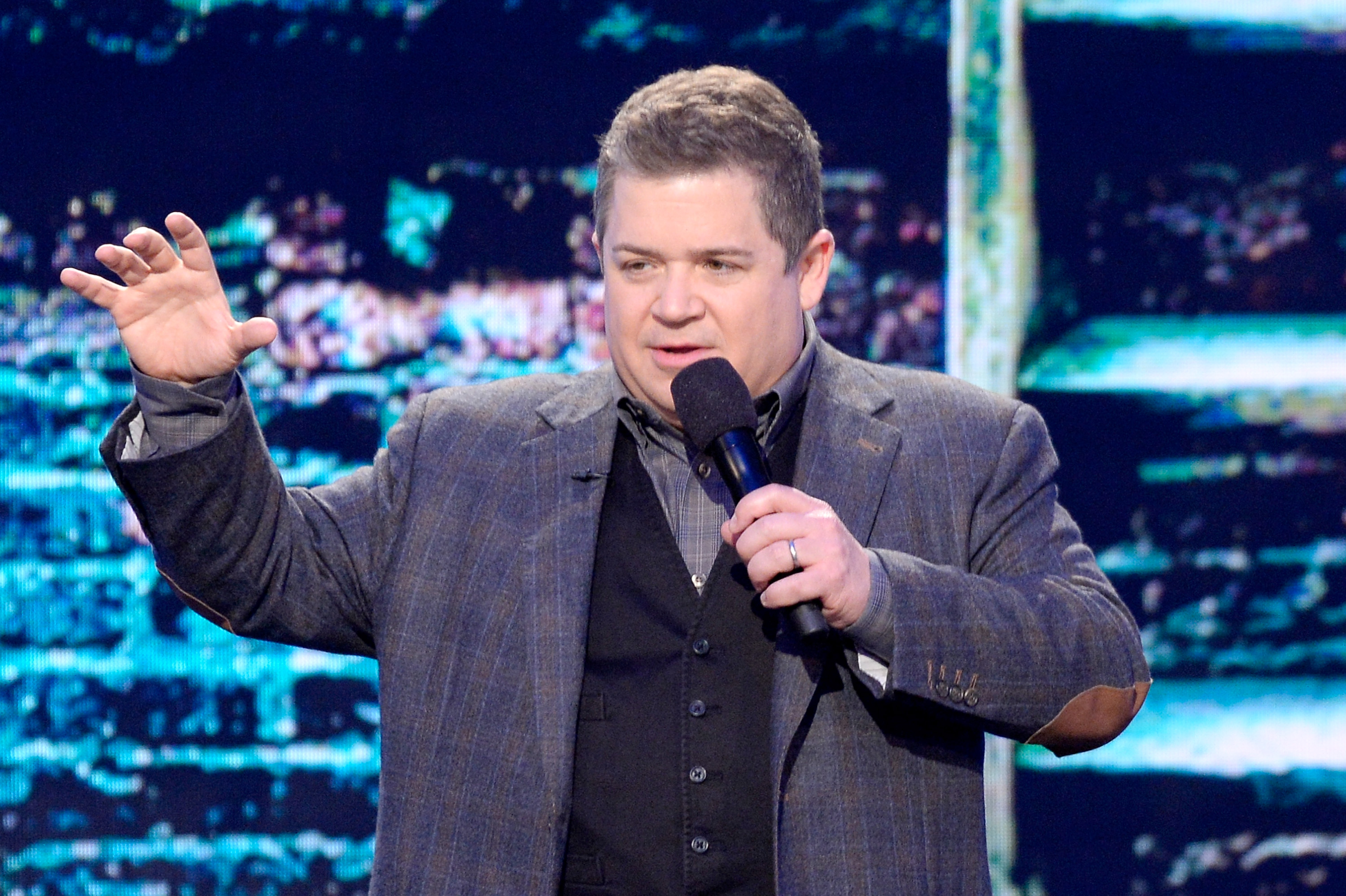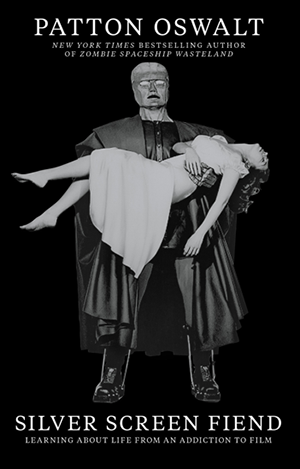Comedian Patton Oswalt explains how a funny addiction changed his life
Comedian Patton Oswalt unspools his origin story

A free daily email with the biggest news stories of the day – and the best features from TheWeek.com
You are now subscribed
Your newsletter sign-up was successful
Patton Oswalt can be forgiven for wanting to take a moment and contemplate his past.
Now in his 40s, the rumpled funnyman who made his Carnegie Hall debut earlier this month to a sellout audience — and who just published Silver Screen Fiend, his second book — has been working as a comic for so long that some quick math about his career seems to catch him by surprise.
"I started doing standup in July of 1988, so I've been doing this a while," he tells The Week. "Wow … that means in three years I'll have been doing this for 30 years."
The Week
Escape your echo chamber. Get the facts behind the news, plus analysis from multiple perspectives.

Sign up for The Week's Free Newsletters
From our morning news briefing to a weekly Good News Newsletter, get the best of The Week delivered directly to your inbox.
From our morning news briefing to a weekly Good News Newsletter, get the best of The Week delivered directly to your inbox.
Indeed, that degree of longevity might have contributed to the temptation to revisit the back pages of his life when Scribner Publishing approached him recently to ask whether he'd like to write another book. (His first, 2011's Zombie Spaceship Wasteland, was a collection of essays.)
For the next story he decided to tell in book form, he chose to return to the heady days of 90s-era Los Angeles, back when he was just starting out as a standup comic.
Today, he's a sort of elder statesman of pop culture, with some of his recent work including turns on FX's Justified and ABC's Agents of S.H.I.E.L.D. He has two million Twitter followers and an army of fans. Silver Screen Fiend, meanwhile, takes a look at Oswalt's past, unspooling his origin story within the context of his love of comedy and movies, zeroing in on the span of his life between 1995 and 1999.

That's the period when Oswalt nourished an addiction to movie-watching and theatre-going that pretty much consumed the young comedian, temporarily wrecking his social life and causing him to reexamine his expectations about the entertainment business.
A free daily email with the biggest news stories of the day – and the best features from TheWeek.com
"It really morphed into an addiction, fueled by this delusion that I would be a great director someday," Oswalt tells The Week, recalling how he once thought his cinema feast might even unlock the secret to working behind the camera. "But somewhere along the way, I got stuck on the consuming part."
He'd actually wanted to be a writer first, he explains, until standup clicked. He looked to comedy icons like Richard Pryor for inspiration, eventually enjoying the comedic halo of his circle of friends that includes comics like David Cross and Sarah Silverman.
He explains a little about how it all got started in Silver Screen Fiend, with Oswalt writing about spending the first 19 years of his life basically memorizing every comedy album he could play on his parents' turntable. In addition to routines, he memorized even the heckler put-downs on albums like Rodney Dangerfield's No Respect and Steve Martin's A Wild and Crazy Guy.
He studied, he memorized, began to get laughs with his jokes, and enjoyed the rush that came with it.
The addiction — to comedy or anything, really — comes easy, he explains. Once his directorial ambitions materialized, Oswalt decided they needed to be stoked the same way he absorbed much of his early comedic tradecraft. Which is how Oswalt found himself becoming a denizen of LA's New Beverly Cinema, and over the course of 1995 and 1999, Oswalt's quest to absorb as much cinema as he could saw him take in almost 700 films.
It's not quite the stuff of the addiction sagas that take readers through drug- or liquor-soaked excess. Indeed, from the get-go of his story, Oswalt teases the reader ever-so-slyly:
"I've done my due diligence as far as vices, but I'm an unbearable slouch when it comes to interesting stories connected to them," he writes. "This will be either the most interesting or the most boring addiction memoir you've ever read."
On the blog he maintains via his official website, Oswalt once described the New Beverly — purchased several years ago by fellow cinephile Quentin Tarantino — as a "cool, dark continent of then-forgotten history" when he moved to LA in 1995.
Oswalt's story starts on a hot Saturday in May, on Beverly Boulevard, as he prepares to take in a double feature: Ace in the Hole and Sunset Boulevard. For the next four years, whenever he wasn't pursuing his dream of working as a standup comic, he parked himself in the New Beverly's seats. At one point, a visit to the town in Virginia where he grew up results in Oswalt enlisting an old friend to accompany him to a movie.
Oswalt unleashes a torrent of factoids and ephemera about the film and its influences. It's clear his friend isn't enjoying the crash course in film history, and it hits Oswalt later, looking back: Movies to his friend, and to most people, enhance life. By comparison, films had consumed his.
Iframe Code
Oswalt got over his obsession, and today admits to only a kind of passing relationship with the consumption of filmed entertainment. Life, as it tends to do, plugs the holes that a person's excess might otherwise fill, and when he's not taking film and TV work, he's juggling his art and standup with his commitments as a family man.
"My wife is also writing a book, and I want to be home as much as I can and give her all the time she gave me," Oswalt says. "I'm too busy with traveling, acting and fatherhood to watch a lot of movies — it's just not at the top of my list. I'd like to do another album and really be open to whatever's next. I learned as I get older that making plans and announcing them is just silly."
For now, he's content to retell the story about that time when spare moments tended to send him running full speed into a theater seat, armed with popcorn and the like, ready to be entertained by someone else's stories.
One of the lighter moments in the book comes when Oswalt recalls a visit to the New Beverly in November of 1995 to see Casablanca. Humphrey Bogart's character was about to start the famous "Here's looking at you, kid," speech, when the projector breaks.
The projection room comes alive with activity, as the problem is corrected. The lights dim again. During the gap between silence and the film's resumption, the 20 or so people in attendance, Oswalt included, start whistling — spontaneously, and all together — "As Time Goes By."
"Movies — the truly great ones (and sometimes the truly bad) — should be a drop in the overall fuel formula for your life," he writes. "A fuel that should include sex and love and food and movement and friendship and your own work. All of it, feeding the engine. But the engine of your life should be your life."
Elsewhere, he notes that he as yet still hasn't directed a film, but films don't direct his own life either, anymore. "So that's something," he muses.